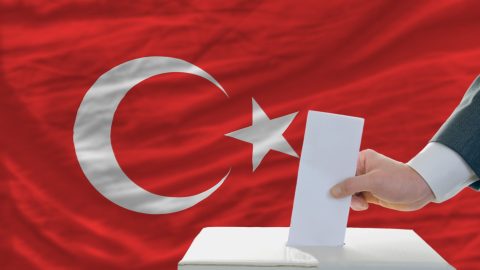The local elections in Turkey had been built up by President Erdogan to be a test of his policies. While Erdogan’s AK Party took the lead in Turkey overall, the governing party did suffer losses in large cities. For example, the AK Party lost its hegemony in Ankara after 20 years, and while votes are still being counted, initial results suggest that the opposition is also ahead in Istanbul. The economic crisis in the wake of last year’s currency crisis is definitely a major reason for the victory of the opposition. The economy is going through a severe recession, unemployment is on the rise, and inflation has increased above 20%.
Turkish assets under strong pressure
In the run-up to these elections, Turkish assets came under strong pressure yet again, much like throughout 2018. The lira has lost 3% against the euro since the beginning of March, the yield of the 5Y local currency bond has risen by 200bps to 18.50%, and the spread of USD-denominated government bonds has widened by 95bps to 495bps. The Turkish central bank was forced to tighten its monetary policy, intervened on the foreign exchange market, and the local banks were told to reduce the liquidity on the local TRY market. This caused the short-term interest rates on the local money market to rise above 1000%.
Turkish households have increasingly converted their savings from TRY to USD. As a result, net foreign exchange reserves have decreased further to currently only USD 24.7bn, despite strong issue activity by the government on international capital markets. While the current account deficit has almost disappeared due to the recession and thanks to the declining oil price (N.B. only 0.7% of GDP in January), the foreign exchange reserves fall significantly short of covering the short-term foreign debt of USD 130bn.
One factor that has been detrimental to any further improvement in recent months is the expansive fiscal policy. Disappointingly low tax revenues on the back of the recession and higher expenses that are partly due to the election cycle have pushed the deficit to a 10-year high. In order to improve the chances of President Erdogan’s AK Party, the government-owned banks have been instructed to expand their lending volume (credit impulse of 2% of GDP), which has a stabilising effect on growth but at the same time has prevented a more significant adjustment of the current account.
Outlook:
we expect the situation to calm in the wake of the local elections due to the decrease in political risk. President Erdogan may have suffered a loss by not being able to capture the Mayor’s seat again in Ankara and possibly Istanbul, but we do not think the overall result suffices to bring about long-term changes. A high nominal interest rate differential, positive real interest rates, a strongly improved current account, and a possible reduction of the election-induced stimulus measures are the local factors that should support Turkish assets. Also, the currently ongoing global loosening of the monetary policy should be supportive to countries like Turkey. The main risk factors are the still existing imbalances, possible mistakes in the monetary and fiscal policy, and the sanctions imposed by the USA over Turkey for buying Russian missile defence systems. Also, a further weakening of global growth, possibly in connection with a reversal of capital flows towards the emerging markets, might exert pressure on Turkish assets.
Legal disclaimer
This document is an advertisement. Unless indicated otherwise, source: Erste Asset Management GmbH. The language of communication of the sales offices is German and the languages of communication of the Management Company also include English.
The prospectus for UCITS funds (including any amendments) is prepared and published in accordance with the provisions of the InvFG 2011 as amended. Information for Investors pursuant to § 21 AIFMG is prepared for the alternative investment funds (AIF) administered by Erste Asset Management GmbH pursuant to the provisions of the AIFMG in conjunction with the InvFG 2011.
The currently valid versions of the prospectus, the Information for Investors pursuant to § 21 AIFMG, and the key information document can be found on the website www.erste-am.com under “Mandatory publications” and can be obtained free of charge by interested investors at the offices of the Management Company and at the offices of the depositary bank. The exact date of the most recent publication of the prospectus, the languages in which the key information document is available, and any other locations where the documents can be obtained are indicated on the website www.erste-am.com. A summary of the investor rights is available in German and English on the website www.erste-am.com/investor-rights and can also be obtained from the Management Company.
The Management Company can decide to suspend the provisions it has taken for the sale of unit certificates in other countries in accordance with the regulatory requirements.
Note: You are about to purchase a product that may be difficult to understand. We recommend that you read the indicated fund documents before making an investment decision. In addition to the locations listed above, you can obtain these documents free of charge at the offices of the referring Sparkassen bank and the offices of Erste Bank der oesterreichischen Sparkassen AG. You can also access these documents electronically at www.erste-am.com.
N.B.: The performance scenarios listed in the key information document are based on a calculation method that is specified in an EU regulation. The future market development cannot be accurately predicted. The depicted performance scenarios merely present potential earnings, but are based on the earnings in the recent past. The actual earnings may be lower than indicated. Our analyses and conclusions are general in nature and do not take into account the individual characteristics of our investors in terms of earnings, taxation, experience and knowledge, investment objective, financial position, capacity for loss, and risk tolerance.
Please note: Past performance is not a reliable indicator of the future performance of a fund. Investments in securities entail risks in addition to the opportunities presented here. The value of units and their earnings can rise and fall. Changes in exchange rates can also have a positive or negative effect on the value of an investment. For this reason, you may receive less than your originally invested amount when you redeem your units. Persons who are interested in purchasing units in investment funds are advised to read the current fund prospectus(es) and the Information for Investors pursuant to § 21 AIFMG, especially the risk notices they contain, before making an investment decision. If the fund currency is different than the investor’s home currency, changes in the relevant exchange rate can positively or negatively influence the value of the investment and the amount of the costs associated with the fund in the home currency.
We are not permitted to directly or indirectly offer, sell, transfer, or deliver this financial product to natural or legal persons whose place of residence or domicile is located in a country where this is legally prohibited. In this case, we may not provide any product information, either.
Please consult the corresponding information in the fund prospectus and the Information for Investors pursuant to § 21 AIFMG for restrictions on the sale of the fund to American or Russian citizens.
It is expressly noted that this communication does not provide any investment recommendations, but only expresses our current market assessment. Thus, this communication is not a substitute for investment advice, does not take into account the legal regulations aimed at promoting the independence of financial analyses, and is not subject to a prohibition on trading following the distribution of financial analyses.
This document does not represent a sales activity of the Management Company and therefore may not be construed as an offer for the purchase or sale of financial or investment instruments.
Erste Asset Management GmbH is affiliated with the referring Sparkassen banks and Erste Bank.
Please also read the “Information about us and our securities services” published by your bank.
Subject to misprints and errors.



